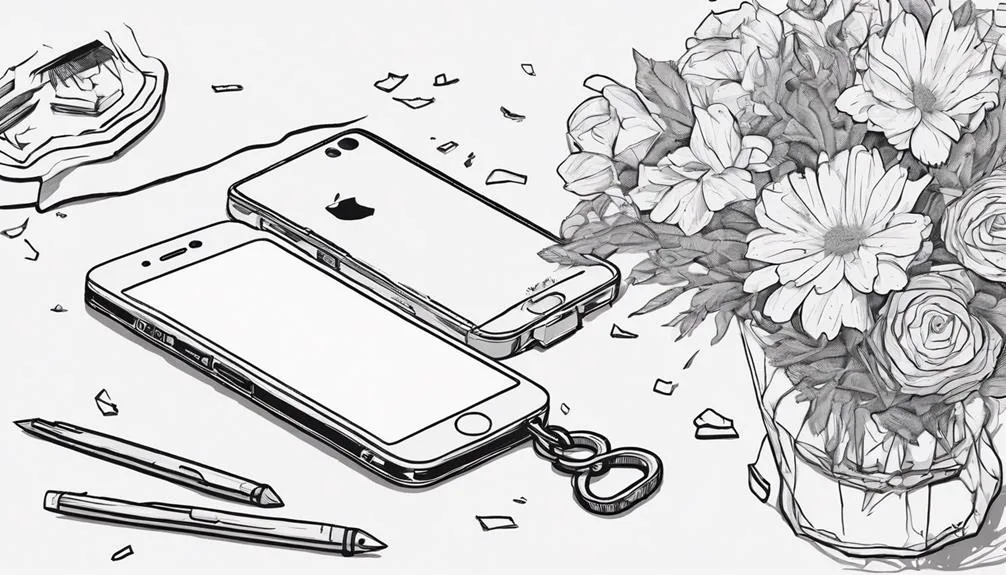Navigating relationships can feel like a careful balance act. Often, behaviors like intense jealousy or frequent criticism seem like they come from love or concern but are actually harmful. These actions can damage the trust and respect needed for healthy relationships.
Recognizing the difference between caring and controlling is key. This article will help you spot toxic habits that may be affecting your relationships, setting the stage for building stronger, healthier connections.
Key Takeaways
- Excessive jealousy often disguises trust issues, mistakenly deemed normal in relationships.
- Constant criticism, mistaken for honesty, can significantly undermine a partner's confidence.
- Ignoring or overstepping personal boundaries is commonly overlooked but damages mutual respect.
- Dependency, portrayed as romantic devotion, actually places undue strain on relationships.
Excessive Jealousy

At the heart of many toxic relationships, excessive jealousy often plays a pivotal role, signaling deeper trust issues that need addressing. When you're constantly questioned about your whereabouts or who you're with, it's not just annoying; it indicates a lack of trust.
This behavior can lead you down a path of social isolation, as your partner's jealousy often demands you cut ties with friends or avoid certain social situations to prevent arguments. This isolation isn't about protecting the relationship but controlling it through fear and manipulation.
It's essential to recognize these signs early. If trust issues and jealousy are driving you away from your support network, it's a red flag that shouldn't be ignored. Addressing these issues head-on is essential for your well-being.
Constant Criticism

Another toxic habit that can erode the foundation of a relationship is constant criticism, where you're frequently made to feel like you're never good enough. This persistent negativity not only undermines your confidence but also hampers personal growth. It's important to distinguish between constructive feedback, which is meant to support and uplift, and criticism that serves no purpose other than to demean.
Here's how to navigate this:
- Recognize the difference between helpful critique and harmful criticism.
- Communicate your feelings and set clear expectations with your partner.
- Focus on specific behaviors rather than personal attacks.
- Seek opportunities for personal growth and encourage your partner to do the same.
Embracing these steps can foster a healthier, more supportive relationship environment.
Ignoring Boundaries

Ignoring boundaries undermines the mutual respect that's important for a healthy relationship. When you don't respect your partner's limits, you're basically saying their needs and comfort don't matter. It's vital to understand that personal autonomy is a cornerstone of any healthy partnership. Boundary education helps both partners understand where lines should be drawn.
| Aspect of Boundaries | Why It's Important |
|---|---|
| Emotional Boundaries | Protects personal autonomy and guarantees feelings are respected. |
| Physical Boundaries | Honors personal space and physical comfort levels. |
| Time Boundaries | Allows for individual interests and personal time management. |
| Digital Boundaries | Respects online privacy and personal digital space. |
Respecting these aspects fosters a relationship built on mutual respect and understanding, essential for a healthy, loving partnership.
Overdependence

While respecting boundaries is foundational, it's equally important to avoid becoming overly dependent on your partner for your emotional well-being. This overdependence can manifest in several toxic ways:
- Expecting your partner to solve all your problems, which places an unfair burden on them.
- Seeking constant reassurance, leading to a cycle of neediness that can exhaust both partners.
- Financial control, where one partner becomes too reliant on the other for monetary support, limiting their independence.
- Social isolation, where you find yourself drifting from friends and family because your partner becomes your sole focus.
These behaviors not only strain the relationship but also hinder personal growth and autonomy. Striking a balance between support and independence is key to a healthy partnership.
Keeping Score
Often in relationships, partners may fall into the toxic habit of keeping score, subtly tallying each other's mistakes and perceived slights. This dangerous game turns every mistake into a point against you, transforming apologies into currency. Suddenly, you're not just saying sorry; you're paying off a debt, hoping to balance the invisible ledger between you and your partner. This mentality fosters resentment, not resolution.
Additionally, this scorekeeping can escalate into revenge spending, where one partner makes purchases to 'get back' at the other for past grievances. It's a cycle that undermines trust and communication, replacing them with a transactional view of love and affection. Recognizing and stopping this behavior is vital for the health of your relationship.
Passive Aggressiveness

Passive aggressiveness can erode the foundation of your relationship, turning minor irritations into major rifts without clear communication. You mightn't even realize you're engaging in these harmful behaviors, but recognizing them is the first step toward change.
Here are some common ways passive aggressiveness manifests:
- Silent treatment: Instead of discussing what's bothering you, you shut down communication, leaving your partner in the dark.
- Sarcasm use: You might think it's lighter to joke about issues, but sarcasm can mask true feelings and intentions, leading to misunderstandings.
- Backhanded compliments: These are a way to express displeasure while disguising it as praise.
- Procrastination on shared tasks: Deliberately delaying tasks as a form of silent protest or punishment.
Tackling these habits head-on can dramatically improve your relationship's health.
Lack of Communication

Building on the idea of passive aggressiveness, a lack of communication further strains relationships by leaving important feelings and thoughts unexpressed. When you're upset, you might resort to giving the silent treatment instead of addressing the issue head-on. This approach not only creates a barrier but also fosters resentment on both sides.
Additionally, avoiding confrontation may seem like the easier path. You think you're dodging a bullet by not stirring the pot, but in reality, you're letting problems fester. These issues, left unattended, can grow into insurmountable obstacles.
Disrespecting Privacy

Frequently, invading your partner's privacy can severely damage the trust that's essential for a healthy relationship. It's crucial to recognize the fine line between interest in your partner's life and disrespecting their need for privacy. Here are some common violations:
- Social snooping – Scrolling through their social media messages or friend lists without permission.
- Checking their phone – Reading texts or call logs when they're not around.
- Personal interrogations – Pressing for details about every aspect of their day or personal thoughts they're not ready to share.
- Overstepping boundaries – Ignoring their requests for personal space or time alone.
These actions not only betray trust but also signal a lack of respect for your partner's autonomy. Respecting privacy is foundational in nurturing a healthy, loving relationship.
Conclusion
Identifying harmful behaviors like excessive jealousy, constant criticism, and disrespecting privacy marks the beginning of a journey toward healthier relationships. It's essential to recognize that love should be nurturing, not toxic.
Taking positive steps such as seeking support, establishing boundaries, or making the tough decision to walk away, are crucial for one's well-being.
At the heart of every enduring relationship are trust, respect, and genuine care. Are we nurturing these values in our connections, or are we letting toxic habits take root? Reflecting on this can guide us toward more fulfilling interactions with others.

